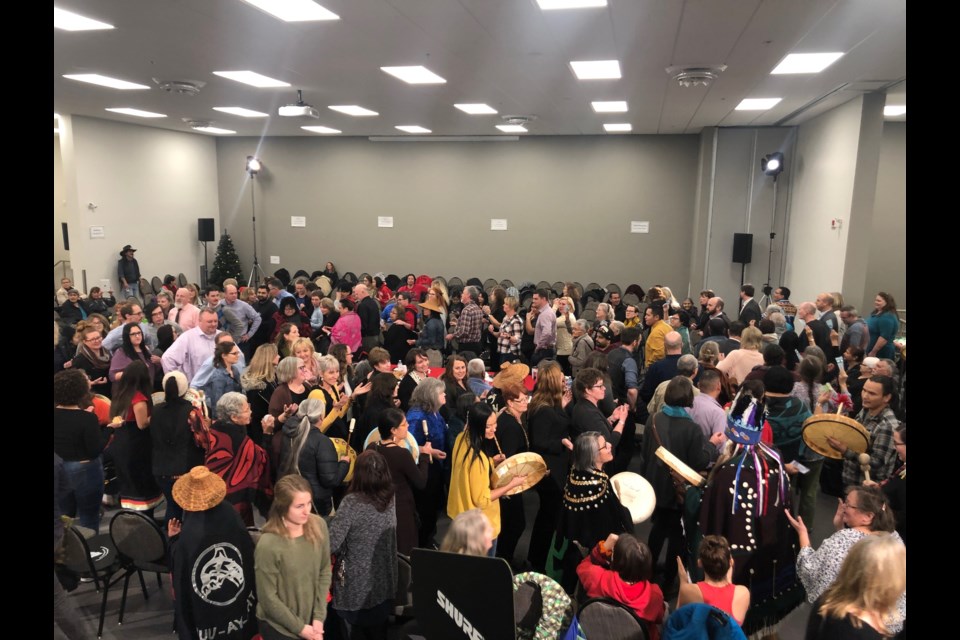Lheidli T’enneh has made history.
After 73 years, the Host First Nation has regained its Balhats (potlatch) system of governance. An All Clans Balhats was held today (Nov. 29) to celebrate the unique partnership between the Lheidli T’enneh and School District No. 57 (SD57).
“It’s great for everyone to be here to witness the first Balhats in decades,” said Lheidli Chief Clay Pountney. “Our language is just being brought back, our culture is just being brought back and this is a good starting point right now.”
The last Balhats believed to be held in Lheidli territory happened in 1946. As part of a racist assimilation policy, the federal government banned potlatch from 1884 to 1951.
Potlatch is a practice that is integral to the governing structure, culture and traditions of many First Nations.
“Today is the day Lheidli regained the Balhats, regained our history and turned the corner toward a vibrant and sustainable future,” adds Pountney.
This is also believed to be the first instance in Canada where an Indigenous Nation is reclaiming its most important governance system and at the same time recognizing and celebrating a unique partnership with its local school district.
Lheidli and SD57 have worked diligently over the past few years to develop a Local Education Agreement to support the Aboriginal Education Advisory Committee.
About 30 per cent of students in the district self-identify as Indigenous and one of Lheidli’s key principals is to ensure its students, and those of other Indigenous nations, are supported at every level to achieve educational success.
“I think this is a historic event to bring the Balhats back,” said Trent Derrick, SD57’s vice-chair of the Board of Education.
“It’s a governance system and with this governance system, the first act of business is what we are going to talk about today in my role as a school board trustee.”
Derrick explained on May 28, 2019, the school board voted unanimously to form an Ad Hoc Committee to implement the calls to action from the Truth and Reconciliation Report as well as the United Nations Declaration on the Rights of Indigenous Peoples (UNDRIP).
“We as a board made this commitment unanimously and I am standing before you in your governance, your Balhats, making a commitment to build a new relationship between Lheidli T’enneh and SD57,” said Derrick.
“When his motion passed no one could have envisioned six months and one day later we would be here together witnessing the Balhats being restored.”
The restoring of the Balhats also follows another historic moment as only days before on Nov. 26, B.C. became the first province in Canada to officially implement UNDRIP.
The legislature passed a bill that mandates the provincial government to bring its policies and laws into harmony with the aims of UNDRIP.
“Witnessing today’s event is like breathing life into Canada’s apology in 2008 where they recognized the effects of residential schools and the effects they’ve had on our culture and language,” said Pam Spooner, who is the director of Aboriginal Education at SD57 and of the Gitxsan First Nation.
“On Tuesday, when they recognized UN declaration into legislation it meant a lot to Indigenous people. It’s telling everyone we have a basic human right to practice our culture and language and to have self-governance over ourselves. So, today is so historical and it’s such an honour to witness the work that is being done.”
Chief Pountney says today’s All Clans Balhats will serve as a platform for future Balhats.
During the Balhats business, Lheidli also gifted each school principal in the district with a Lheidli T’enneh flag and plaque.







